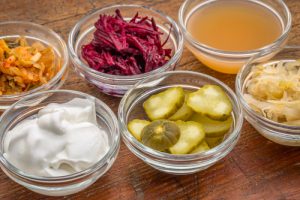As we enter the spring and summer months, Brits are looking for ways to improve their health – specifically their gut health.
Benenden Health has spotted that searches for ‘best foods for gut’ have increased by 88 per cent since January, while searches ‘how to support gut health’ are up 200 per cent compared to the same time last year.
The gut is essential to our overall physical and mental health, with 80 per cent of the immune system lying in it. So, it is perhaps no surprise that people are trying to understand how to support their gut health.
To help, the experts at Benenden Health have created the Go With Your Gut quiz.
Designed to help people understand how they can better support their gut health, the quiz allows users to check in with their current eating and lifestyle habits.
Abir Hamza-Goodacre, Registered Nutritional Therapist at Benenden Hospital explains:
“The gut microbiome is an ecosystem and it is important that all the different microorganisms within it are balanced – dysbiosis is the term for when your gut microbiome is out of balance.
“When it comes to supporting this diverse ecosystem and looking at your gut health, it is never just one thing in isolation. Given the gut is so intrinsic to your overall wellbeing, you have to look at your wider lifestyle and what could be affecting your gut health.
“While the gut is complex and a multitude of factors impact an individual’s digestive health, there are fortunately a range of changes you can make to your lifestyle and diet to support a balanced gut.”
5 expert-approved tips to improve your gut health:
- Eat a whole food diet
Diet is key to gut health. Often, the people with a healthy and diverse gut ecosystem are those who eat a range of colourful fruits and vegetables every day.
As tasty as they may be, be careful of consuming too many processed foods, sugary snacks, and unsaturated fats. These are often the types of food that cause an imbalance between bad and good gut bacteria.
Instead, try to incorporate a diverse range of fruits and vegetables into your everyday diet. It is also important to include sources of insoluble fibre in your diet, which help to speed up the passage of food through the stomach. Some delicious examples of insoluble fibre sources include nuts, grains, legumes, cauliflower, strawberries, and raspberries.
- Embrace fermented foods
 Some of the best foods you can eat to support gut health are fermented foods.
Some of the best foods you can eat to support gut health are fermented foods.
Recent research has found that prebiotic foods improved cognition, ageing and frailty in older people.[1] Eating fermented food can help boost the number of good bacteria, also known as probiotics, in your gut, ultimately aiding your digestive system.
Examples of fermented foods include plain yoghurt, kefir, kimchi, miso, and tempeh. These delicious foods are not only great for your gut, but might inspire you to try cooking something new in the kitchen – which is always a plus!
- Re-assess your stress
When it comes to our lifestyle and gut health, do not underestimate the effect of stress on gut health.
Research has shown that high stress levels can cause a reduction in good bacteria.[2] Consistently high stress levels could be the cause of an unhealthy gut and also lead to digestive issues such as constipation or a loss of appetite.
If you are live a high-stress lifestyle, then think how you might be able to reduce these feelings. Certain ways to do so may be more significant and need serious consideration, such as a career change or ending a relationship. Nevertheless, there are smaller steps such as practising mindfulness, exercising more, and speaking to a mental health professional could all improve your overall wellbeing and gut health.
- Move your body
 Increasing your activity levels is not only great for your wellbeing and stress levels, but exercise is also directly beneficial for your gut.
Increasing your activity levels is not only great for your wellbeing and stress levels, but exercise is also directly beneficial for your gut.
The increased oxygen in your bloodstream and rise in body temperature that comes with exercise are exactly the conditions your good gut bacteria thrive on.
If you aren’t too confident when it comes to working out or don’t have a very active lifestyle, then start by making small changes. For example, you could head out for a quick power walk or gentle jog on your lunch break.
For those who have joint pain or are perhaps exercising at home and want to avoid making too much noise, pilates and yoga are great low impact exercises to strengthen muscles and work up a sweat.
- Avoid artificial sweeteners
Another simple dietary change to make for your gut is to avoid foods that contain artificial sweeteners.
While you may think that opting for ‘sugar free’ or ‘diet’ foods and drinks are better for you, especially if you are trying to lose weight, they can in fact be worse for the gut microbiome.
Artificial sweeteners can disrupt the balance of beneficial bacteria in your gut. An imbalanced gut flora can lead to stomach disturbances such as gas and bloating as well as more long-term symptoms, for example unintentional weight changes or constant fatigue.
If you do have a more sensitive gut or notice uncomfortable stomach symptoms occurring after consuming products high in artificial sweeteners, then try to avoid them. Instead, opt for naturally sweet foods, such as banana, berries, sweet potatoes, and cashew nuts.
So there you have it, five top tips from a nutritional therapist for improving your gut health. To find out more about your gut health knowledge, try out the Go with Your Gut quiz.
How turmeric can improve your skin





